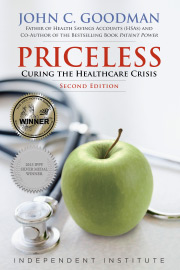Civilization as we know it is coming apart according to the editorial board of The New York Times. This is how last Thursday’s lead editorial addressed the failure of the states to expand Medicaid, even though the federal government is willing to pick up 100 percent of the costs of the expansion for the next few years:
“As Robert Pear of The Times recently reported, more than half of all people without health insurance live in states that are not planning to expand coverage. Many of those states already do a terrible job of covering the poor and have no interest in changing their ways, no matter the financial incentive.
On Medicaid, education and many other issues, the map of the United States is becoming a patchwork of conscience and callousness. People on one side of a state line have access to health care, strong public schools and colleges, and good transportation systems, while those on the other side do not. The breakdown of a sense of national unity in Washington is now reflected across the country, as more than two dozen states begin to abandon traditions of responsible government.”
It is only natural to suspect that the entire editorial was ghost written by Paul Krugman, The Times columnist best known for over-the-top hyperbole. Yet in his column the next day, Krugman showed that when it comes to irresponsible editorial writing, he is nonpareil:
“[T]he only way to understand the refusal to expand Medicaid is as an act of sheer spite...Just think about this for a minute. It’s one thing when politicians refuse to spend money helping the poor and vulnerable; that’s just business as usual. But here we have a case in which politicians are, in effect, spending large sums, in the form of rejected aid, not to help the poor but to hurt them.”
And the consequences of all this maliciousness?
Medicaid rejectionism will deny health coverage to roughly 3.6 million Americans, with essentially all of the victims living near or below the poverty line. And since past experience shows that Medicaid expansion is associated with significant declines in mortality, this would mean a lot of avoidable deaths: about 19,000 a year, the study estimated. (Emphasis mine.)
...Sorry for that pause. I was overcome by a sudden surge of grief...
But wait a minute. Something is wrong here. Let’s see...there are about 50 million uninsured...mostly living in states that are not expanding Medicaid...and as a result there will be 3.6 million who don’t get insured...and...3.6 divided by 50...is 7.2 percent.
Hmmm. Only 7.2 percent of the uninsured will fail to get insurance because half the states don’t expand Medicaid? We could fail to insure that many just by bureaucratic snafus alone.
I suppose we should cut the folks at The Times some slack. When you are contemplating the collapse of civilization and the virtual murder of thousands of innocent victims by spiteful Republican governors how can you expect editorial writers to spend too much time dealing with such nettlesome things as actual facts?
But for those whose curiosity impels them to try to understand rather than merely deplore, here is the rest of the story.
Let’s begin with Krugman’s claim that the failure of the states to expand Medicaid will cause 19,000 deaths a year. This number comes from an extrapolation by RAND Corporation researchers of a study by Katherine Baicker and her colleagues finding association, but not causation, between Medicaid enrollment and reduced mortality. What Krugman doesn’t tell his readers is that Baicker was the lead author of a more recent and much more careful study of the issue involving the Oregon Medicaid experiment. That study found no effect of Medicaid (versus uninsurance) on health! Further, the Oregon study is consistent with most of the serious literature on this subject, including a very famous study by the RAND Corporation itself.
Surely Krugman must know this. If he doesn’t, he could easily discover it on his own or by walking down the halls at Princeton and asking his colleagues in the economics department.
With respect to the more general issue, the Obama administration cannot force the states to expand their Medicaid program, as a result of a Supreme Court decision. So what happens if they don’t? The Affordable Care Act (ObamaCare) says that people who are not eligible for Medicaid and who earn between 100 and 133 percent of the federal poverty level are entitled to enter the newly created health insurance exchanges and get full private insurance coverage by paying no more than 2 percent of their income in premiums (3 percent for those earning between 133 and 138 percent of poverty).
This means that instead of being pushed into Medicaid (with its well-known access problems and rationing by waiting) near poor families will instead be able to purchase private insurance for less than 5 cents on the dollar—all subsidized by the federal government. It also means that instead of receiving federal dollars to pay for Medicaid insurance, these states will be receiving even more federal dollars through the subsidies for private coverage.
When President Obama and most Democrats in Congress talk about health reform, they imply that subsidized insurance in the exchanges will be similar to the private insurance people have today. If so, the newly insured will have insurance much better than what Medicaid offers, and doctors and hospitals will receive a lot more money than they would have received with Medicaid expansion.
On the average, Medicaid pays providers only about 59 percent of what a private insurers pay. In some states it’s even lower. For example:
· New York pays primary care physicians only about 29 percent of what private insurers pay.
· The comparable figure in New Jersey is 33 percent.
· In California it’s 38 percent.
Many believe that these low rates mean cost shifting—as other payers pay more to subsidize Medicaid patients who pay less, although see Austin Frakt’s review of the literature.
In a study for the National Center for Policy Analysis, Devon Herrick estimated how much additional medical spending each state would receive if 70 percent of those eligible got subsidized private health insurance in the exchanges rather than enroll in Medicaid. The numbers are quite large, totaling nearly $22 billion per year.
· Californians would enjoy about $3 billion a year in additional spending.
· Florida could expect $2 billion more dollars spent on care.
· Texas would receive about $3 billion more.
Krugman refers to a RAND study of 14 states that will apparently forgo Medicaid expansion:
“The result, the study concluded, would be a huge financial hit: the rejectionist states would lose more than $8 billion a year in federal aid, and would also find themselves on the hook for roughly $1 billion more to cover the losses hospitals incur when treating the uninsured.”
Yes, but $9 billion would be less than half the additional spending these states would receive if patients had private insurance instead.
There is one caveat. Subsidized insurance in the health insurance exchanges may not be like private insurance is today. It may be more similar to Medicaid. We have to be alert to a bait and switch. As I reported last week:
Insurance sold in the Massachusetts exchange pays doctors and hospitals only about 10 percent more than what Medicaid pays. And for reasons that are not entirely clear, doctors are less willing to see the newly insured (with exchange subsidies) than Medicaid patients.
Also, in the California exchange:
[T]he fees paid to providers will not be the same as commercial insurance are paying. They will be somewhere between the commercial rates and Medicare rates.
It is even possible that in some states the subsidized plans will pay less than what Medicaid pays.
The choice to expand, therefore, is complicated—even from a purely financial point of view.
There are more considerations. The Heritage Foundation finds that 80 percent of the states will be worse off from Medicaid expansion as the federal government reduces its commitment to bear 100 percent of the costs in the next few years. The fate of the states will be even worse if the federal government reneges on its commitments—certainly a possibility depending on future elections. Urban Institute economists disagree, but reasonable people can line up on either side of the argument.
At least for now, however, it appears that most states will gain by refusing to expand Medicaid to people between 100 percent and 138 percent of the poverty level. And if they currently cover some people in this income range, they would be better off by rolling back coverage to100 percent.
But there is another wrinkle caused by another oddity in the Affordable Care Act.
It turns out that below 100 percent of poverty, people who are not eligible for Medicaid will not be entitled to subsidized insurance in the health insurance exchanges. (In a lot of states, some populations are covered above 100 percent—say, parents with children—while other populations are not covered at all or are covered at a level below 100 percent—say single adults.) For this group, it is tempting to expand Medicaid coverage and let the federal government pick up the entire tab.
However, the Obama administration is unwilling to allow states to “partially expand” Medicaid—at least with the federal government picking up 100 percent of the costs of the expansion. I don’t necessarily blame them for this. If states could do whatever is in their own interest, the cost to the federal taxpayer would be large. I do blame them for not agreeing to win/win changes, however.
Take a state like Texas. It spends billions of dollars on indigent health care through “health districts.” In Dallas, for example, Parkland Hospital and its clinics offer care on a sliding pay scale to families up to 250 percent of the federal poverty level. But since these expenses are not part of Medicaid, the federal government doesn’t match them. A reasonable reform would be to allow Texas to have all its Medicaid money as a block grant, provided that the state agrees to integrate Medicaid with the health district money and cover all the population below 100 percent of the federal poverty level.
Rhode Island has shown that a Medicaid block grant can save money and improve care. It’s time to allow other states to have a shot at similar reforms.
For now, it is not the states that are standing in the way of insuring the uninsured. It is the Obama administration.











